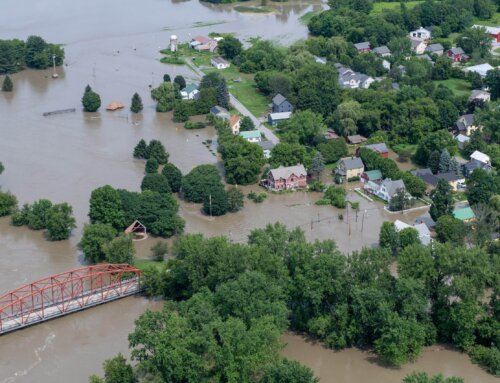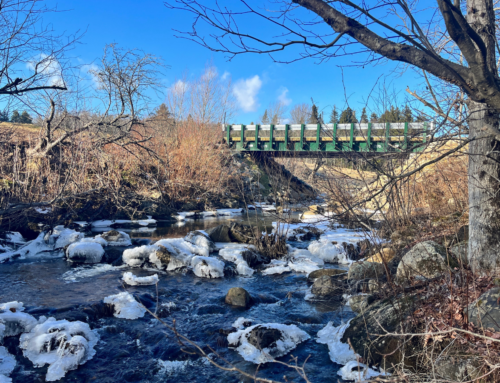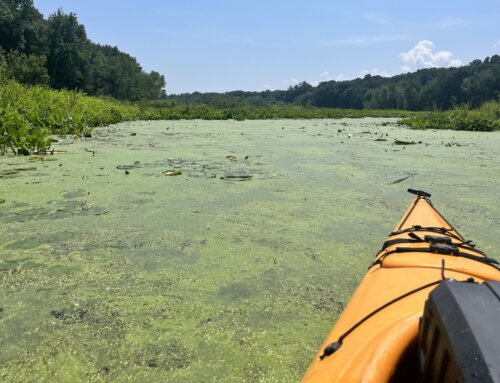Targeting Solutions to Trash Pollution
Watershed Council aims to put itself out of the river cleanup business
Greenfield, MA – The Connecticut River Watershed Council (CRC) hosts their 20th annual Source to Sea Cleanup on Friday & Saturday, September 23 & 24. After two decades of cleaning up our rivers, CRC continues to work toward solutions to the persistent issue of trash pollution. The Source to Sea Cleanup is a two-day river cleanup coordinated by CRC in all four states of the 410+ mile Connecticut River basin (NH, VT, MA, CT). Each fall, thousands of volunteers remove about 50 tons of trash along rivers, streams, parks, boat launches, trails and more. For more information or to register for the event, visit ctriver.org/cleanup.
In addition to annually coordinating volunteers to clean up trash in our rivers, CRC is focusing on pollution prevention. “Our goal is to keep trash and tires from getting in our rivers in the first place and to eventually put ourselves out of the business of cleaning up our rivers,” says Alicea Charamut, CRC River Steward and Cleanup organizer. “We’ve heard from a number of cleanup groups that their areas are staying cleaner each year. So we’re making progress but more needs to be done.” CRC collects data from cleanup groups about the amount and types of trash they find. This data supports CRC’s year-round advocacy efforts and informs policies and legislation that will keep waste out of our rivers.
CRC supports a ban on Styrofoam products—especially Styrofoam dock supports, in favor of enclosed foam or non-foam dock materials—as well as reducing the use of and increasing the recycling of plastic bottles and plastic bags. CRC is also working with river states on extended producer responsibility (EPR) systems that hold producers responsible for free and easy disposal of items like tires, paint, mattresses, batteries, electronics and appliances as well as market development to create uses for recycled materials.
“A massive tire dump along the Deerfield River in Greenfield, MA is just one example of how trash is a major problem for the health and cleanliness of our rivers,” notes Charamut. CRC began working to clean up the Greenfield tire dump in 2014 and is continuing efforts this year. But small trash items like plastic and Styrofoam, in particular, are also a major concern. Single-use plastic bags, micro-beads, and Styrofoam pieces are too small or break down too quickly to be cleaned up easily. Wildlife mistake this trash for food and become sick or die from eating it. Or the trash makes its way to the ocean and contributes to huge floating garbage patches. To date, volunteers have kept more than 947 tons of trash from polluting our rivers.
“The biggest change happens when every single one of us make small changes in our daily lives to reduce waste,” says Charamut. She suggests carrying a re-usable water bottle instead of purchasing bottled water, using re-usable shopping bags instead of disposable plastic bags, or bringing a re-usable travel mug when getting your morning cup of coffee as easy ways to reduce waste.
“We all have a responsibility to solve this problem—individuals, manufacturers, businesses, and government,” says Andrew Fisk, CRC Executive Director. “By working together, we can make a real difference for our rivers.” If you know of a trash site in need of cleanup help, you are encouraged to report it to CRC via their Source to Sea Cleanup website, ctriver.org/cleanup, or contact CRC’s Cleanup Coordinator Alicea Charamut at cleanup@ctriver.org or 860-704-0057.
Lead Source to Sea Cleanup sponsors — NRG Energy’s Middletown Generating Station, Pratt & Whitney, TransCanada, and Whistler — are pleased to support CRC’s efforts. “Sponsor support enables us to continue growing the Source to Sea Cleanup so that it has an impact beyond the two days of cleanup,” notes Fisk.
The Connecticut River Watershed Council works to protect the watershed from source to sea. As stewards of this heritage, we celebrate our four-state treasure and collaborate, educate, organize, restore and intervene to preserve its health for generations to come. Our work informs our vision of economic and ecological abundance. To learn more about CRC, or to join the effort and help protect our rivers, visit ctriver.org.
###







